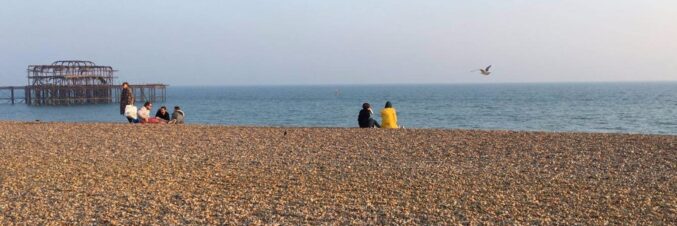
We have a shedload of new courses beginning over the next few weeks, giving everyone the chance to study something of interest. We have both online and face to face courses and we look forward to seeing you in one – or more – of the spaces. As ever, courses have a forum on our online learning and communication platform called Ryver, so get in the Ryver by following the instructions here.
Here’s a short summary of what’s on offer:
Ethics, Care and Accountability
Tutor: Elizabeth Vasileva
Wednesday evenings, 7pm to 9pm on Zoom
Eight weeks, 13th April to 1st June 2022 STARTS THIS WEEK
In this class we turn to the way in which the various issues and problems of contemporary society are seen through the perspective of care. We will engage with various ethical themes, such as universalism, normativity, ethical behaviour and ethical knowledge. We will redefine some of these in the light of recent works on ethics by Baruch Spinoza, Deleuze and Guattari, Karen Barad, Rosi Braidotti, Karen Houle and others. We will draw mostly on feminist and new materialist theorists, bringing more focus onto bodies, matter, the environment and affect. The class aims to have a practical focus in the form of trouble-shooting ethical problems from the perspective of care, so bring your own!
Click on forum shortcut +EthicsCare for more info.
The Questioning of Intelligence, Part Three: The Resonance of Intelligence
Tutor: John Thornton
Saturdays, 10am to 2pm
Ten weeks, 23rd April – 25th June 2022
Venue: Brighthelm Centre Chapel Room, North Road, Brighton BN1 1YD
With huge thanks to The Brighthelm Centre for giving FUB free teaching spaces this year.
Part Three of the course covers the last five chapters of the book (starting at Chapter Ten). Here we trace out the form of an alternative understanding of being to that of our current scientific materialism. We ask how the universe and our being in it would look if we gave up our fixation on the material being of physical stuff, and the psychic being of an egoic thinking self. Instead we consider the being of a world of form appearing in the clearing of immediate consciousness. From this place we re-examine the meaning of our scientific discoveries, concerning the being of the universe, and the form of the living cell and its DNA, and of the multicellular organism, the neuron and its brain, and of that extraordinary process that the human brain enacts: human language itself. On this basis, we finally get to grips with the overarching question of the course: What is Intelligence?
Note: Part Three of the course assumes you have completed Parts One and Two. Students can join the course without attending these other courses on the understanding that they will have already read the first nine chapters of The Questioning of Intelligence and listened to the Part One and Two lecture recordings.
Click on forum link +Intelligencepart3 for more info.
Music and Power
Tutor: Nora Ziegler
Tuesday evenings, 7pm to 9pm on Zoom
Four weeks, 26th April – 17th May 2022
This short online course explores the subversive and transformative potential of music. We will discuss the subversive power of Billie Holiday’s music in terms of the “aesthetic dimension” theorised by Herbert Marcuse and Angela Davis. We will listen to lyrics by Ms. Lauryn Hill from the perspective of W.E.B. Du Bois’ theory of “double consciousness”. Listening to Jimi Hendrix, we will explore the decolonial humanism of Frantz Fanon and Sylvia Wynter.
Click on forum shortcut +MusicPower for more info.
Existentialism & the Literature of The Absurd
Tutor: Charlie Blake
Saturday mornings, 11am to 2pm
Ten weeks, 30th April – 16th July 2022 with two breaks
Venue: Brighthelm Centre Activities Hall, North Road, Brighton BN1 1YD
With huge thanks to The Brighthelm Centre for giving FUB free teaching spaces this year.
This course will focus on the notion of ontological absurdity and its practical consequences in everyday life and revolutionary change. It will consider short texts from, say, The Book of Job to Clarice Lispector, via Sade, Kafka, Kierkegaard, Beckett, Baldwin, de Beauvoir, Borges, Burroughs and others within a broader philosophical context from Kantianism to panpsychism. There will also be consideration of cinema, theatre and the visual arts.
Click on forum shortcut +Absurd for more info.
Technologies and Spatial Theory
Tutor: Megan Morgan
Monday evenings, 7pm to 9pm.
Six weeks, 9th May – 13th June 2022
Venue:TBC
This course explores the relationships between space and technology. Home, work, airports, supermarkets, what gives these spaces meaning? How does the use of technologies within these spaces change how we experience them? How do the spaces we inhabit change how we use technologies? What has the pandemic changed about our relationship to space and technology? All these questions and more make up the Technologies and Spatial Theory course. Delivered through a mixture of academic theory, oral histories and student-led empirical research, this course aims to help students think more about the world around them (quite literally) and interrogate the devices we use and their role in our lives.
Click on forum shortcut +TechSpatialTheory for more info
The Politics of Abolition(isms)
Tutor: Melayna Lamb
Wednesday evenings, 7pm to 9pm on Zoom
Eight weeks, 25th May – 13th July 2022
This course is an introduction to the political thought of abolition. With roots in the movement to abolish the slave trade, contemporary movements for abolition tend to focus on the abolition of police and prisons. This course will offer a look at why and how the criminal justice system is necessarily anti-black and what this means for those seeking justice today. We will examine a range of thinkers including academics, musicians and poets that inform the abolitionist imagination(s), thereby revealing a rich tapestry of thought that extends over time and space, challenging conventional wisdom on the carceral state.
Click on forum shortcut +Abolitionisms for more info
